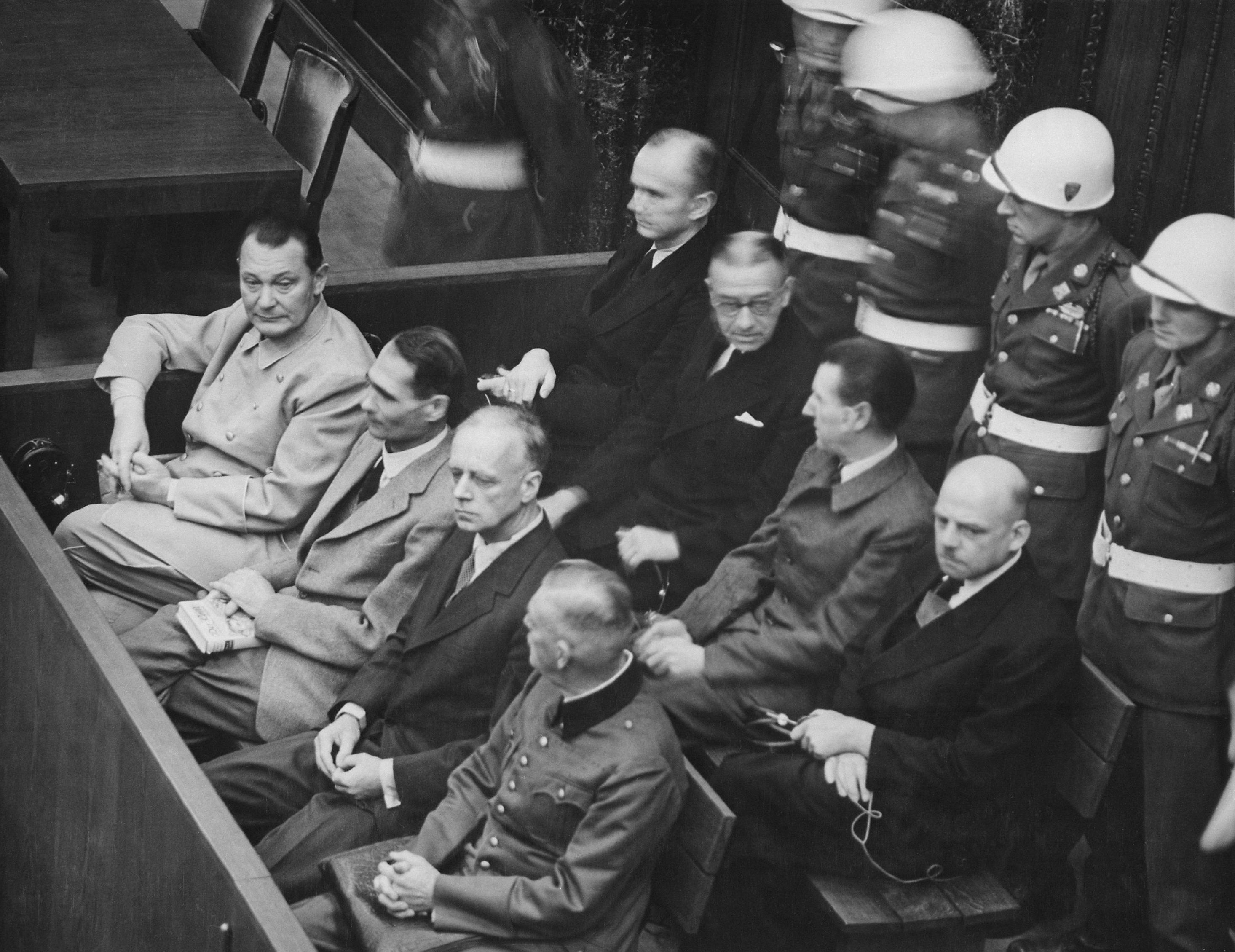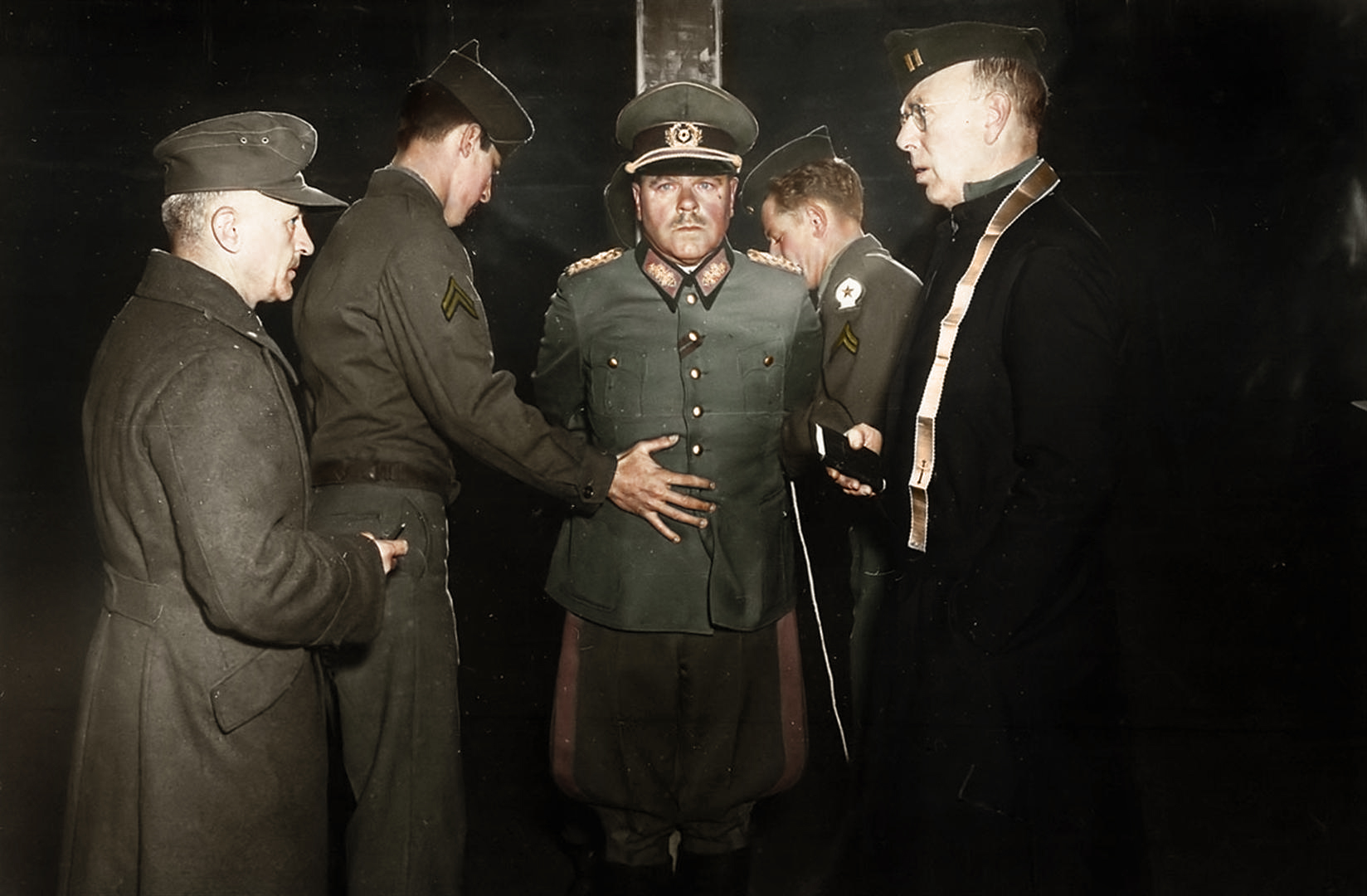|
United States V. Keenan
''United States v. Keenan'' was a court case in the United States where the accused, US Marine PFC Charles W. Keenan, was found guilty of murder after he shot and killed a Vietnamese man under orders from a superior officer. The Court of Military Appeals held that following orders was not a justification if "the order was of such a nature that a man of ordinary sense and understanding would know it to be illegal". The soldier who gave Keenan the order, US Marine Corporal Stanley Luczko, was convicted of killing another Vietnamese person during the same incident. See also * Nuremberg Defense Superior orders, also known as the Nuremberg defense or just following orders, is a plea in a court of law that a person, whether a member of the military, law enforcement, a firefighting force, or the civilian population, should not be considered ... References United States military case law Law articles needing an infobox 1969 in United States case law {{US-case-law-stub ... [...More Info...] [...Related Items...] OR: [Wikipedia] [Google] [Baidu] |
United States
The United States of America (U.S.A. or USA), commonly known as the United States (U.S. or US) or America, is a country primarily located in North America. It consists of 50 states, a federal district, five major unincorporated territories, nine Minor Outlying Islands, and 326 Indian reservations. The United States is also in free association with three Pacific Island sovereign states: the Federated States of Micronesia, the Marshall Islands, and the Republic of Palau. It is the world's third-largest country by both land and total area. It shares land borders with Canada to its north and with Mexico to its south and has maritime borders with the Bahamas, Cuba, Russia, and other nations. With a population of over 333 million, it is the most populous country in the Americas and the third most populous in the world. The national capital of the United States is Washington, D.C. and its most populous city and principal financial center is New York City. Paleo-Americ ... [...More Info...] [...Related Items...] OR: [Wikipedia] [Google] [Baidu] |
Vietnam
Vietnam or Viet Nam ( vi, Việt Nam, ), officially the Socialist Republic of Vietnam,., group="n" is a country in Southeast Asia, at the eastern edge of mainland Southeast Asia, with an area of and population of 96 million, making it the world's sixteenth-most populous country. Vietnam borders China to the north, and Laos and Cambodia to the west. It shares maritime borders with Thailand through the Gulf of Thailand, and the Philippines, Indonesia, and Malaysia through the South China Sea. Its capital is Hanoi and its largest city is Ho Chi Minh City (commonly known as Saigon). Vietnam was inhabited by the Paleolithic age, with states established in the first millennium BC on the Red River Delta in modern-day northern Vietnam. The Han dynasty annexed Northern and Central Vietnam under Chinese rule from 111 BC, until the first dynasty emerged in 939. Successive monarchical dynasties absorbed Chinese influences through Confucianism and Buddhism, and expanded ... [...More Info...] [...Related Items...] OR: [Wikipedia] [Google] [Baidu] |
United States Court Of Appeals For The Armed Forces
The United States Court of Appeals for the Armed Forces (in case citations, C.A.A.F. or USCAAF) is an Article I court that exercises worldwide appellate jurisdiction over members of the United States Armed Forces on active duty and other persons subject to the Uniform Code of Military Justice. The court is composed of five civilian judges appointed for 15-year terms by the President of the United States with the advice and consent of the United States Senate. The court reviews decisions from the intermediate appellate courts of the services: the Army Court of Criminal Appeals, the Navy-Marine Corps Court of Criminal Appeals, the Coast Guard Court of Criminal Appeals, and the Air Force Court of Criminal Appeals. History Courts-martial are judicial proceedings conducted by the armed forces. The Continental Congress first authorized the use of courts-martial in 1775. From the time of the American Revolutionary War through the middle of the twentieth century, courts-martial were ... [...More Info...] [...Related Items...] OR: [Wikipedia] [Google] [Baidu] |
Superior Orders
Superior orders, also known as the Nuremberg defense or just following orders, is a plea in a court of law that a person, whether a member of the military, law enforcement, a firefighting force, or the civilian population, should not be considered guilty of committing actions that were ordered by a superior officer or official. The superior orders plea is often regarded as the complement to command responsibility. One of the most noted uses of this plea, or defense, was by the accused in the 1945–1946 Nuremberg trials, such that it is also called the "Nuremberg defense". The Nuremberg trials were a series of military tribunals, held by the main victorious Allies after World War II, most notable for the prosecution of prominent members of the political, military, and economic leadership of the defeated Nazi Germany. These trials, under the London Charter of the International Military Tribunal that established them, determined that the defense of superior orders was no long ... [...More Info...] [...Related Items...] OR: [Wikipedia] [Google] [Baidu] |
Nuremberg Defense
Superior orders, also known as the Nuremberg defense or just following orders, is a plea in a court of law that a person, whether a member of the military, law enforcement, a firefighting force, or the civilian population, should not be considered guilty of committing actions that were ordered by a Officer (armed forces), superior officer or official. The superior orders plea is often regarded as the complement to command responsibility. One of the most noted uses of this plea, or defense (legal), defense, was by the accused in the 1945–1946 Nuremberg trials, such that it is also called the "Nuremberg defense". The Nuremberg trials were a series of Military justice, military tribunals, held by the main victorious Allies of World War II, Allies after World War II, most notable for the prosecution of prominent members of the political, military, and economic leadership of the defeated Nazi Germany. These trials, under the London Charter of the International Military Tribunal tha ... [...More Info...] [...Related Items...] OR: [Wikipedia] [Google] [Baidu] |
United States Military Case Law
United may refer to: Places * United, Pennsylvania, an unincorporated community * United, West Virginia, an unincorporated community Arts and entertainment Films * ''United'' (2003 film), a Norwegian film * ''United'' (2011 film), a BBC Two film Literature * ''United!'' (novel), a 1973 children's novel by Michael Hardcastle Music * United (band), Japanese thrash metal band formed in 1981 Albums * ''United'' (Commodores album), 1986 * ''United'' (Dream Evil album), 2006 * ''United'' (Marvin Gaye and Tammi Terrell album), 1967 * ''United'' (Marian Gold album), 1996 * ''United'' (Phoenix album), 2000 * ''United'' (Woody Shaw album), 1981 Songs * "United" (Judas Priest song), 1980 * "United" (Prince Ital Joe and Marky Mark song), 1994 * "United" (Robbie Williams song), 2000 * "United", a song by Danish duo Nik & Jay featuring Lisa Rowe Television * ''United'' (TV series), a 1990 BBC Two documentary series * ''United!'', a soap opera that aired on BBC One from 1965-19 ... [...More Info...] [...Related Items...] OR: [Wikipedia] [Google] [Baidu] |
Law Articles Needing An Infobox
Law is a set of rules that are created and are law enforcement, enforceable by social or governmental institutions to regulate behavior,Robertson, ''Crimes against humanity'', 90. with its precise definition a matter of longstanding debate. It has been variously described as a Social science#Law, science and as the art of justice. State-enforced laws can be made by a group legislature or by a single legislator, resulting in statutes; by the executive through decrees and regulations; or established by judges through precedent, usually in common law jurisdictions. Private individuals may create legally binding contracts, including arbitration agreements that adopt Alternative dispute resolution, alternative ways of resolving disputes to standard court litigation. The creation of laws themselves may be influenced by a constitution, written or tacit, and the rights encoded therein. The law shapes politics, economics, history and society in various ways and serves as a mediator of ... [...More Info...] [...Related Items...] OR: [Wikipedia] [Google] [Baidu] |


